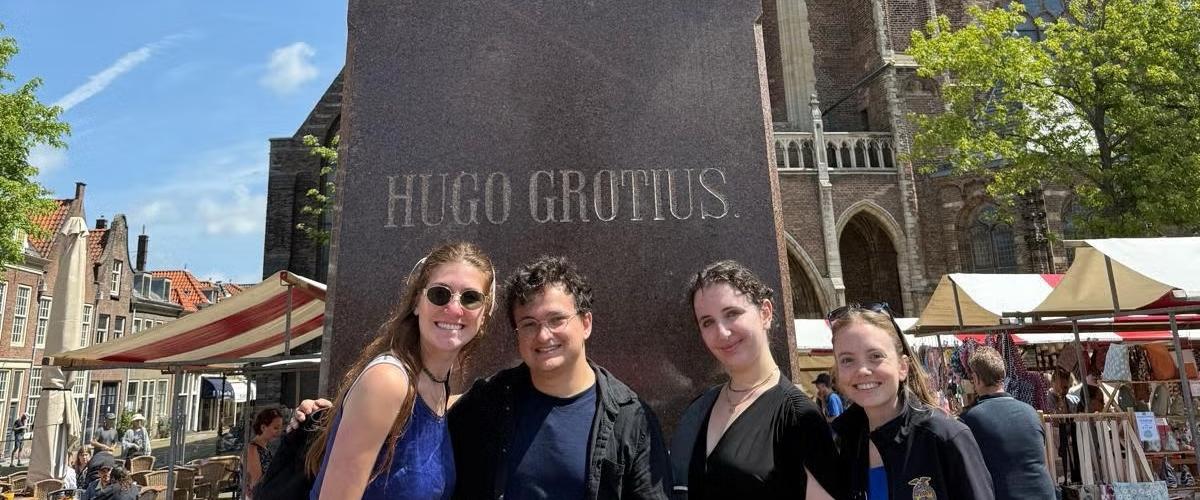Third-year law students Jessica Chapman and Harper Fox spent their summer on a self-designed international law research project around Western and Central Europe to study a topic they are both passionate about: memorialization and the impact of legacy work on local communities and visitors following situations of mass atrocities.
Chapman and Fox visited Holocaust memorials, museums and other sites in Amsterdam, Vienna, Croatia, Budapest, Southern Poland, Prague and Nuremberg, taking into account each country’s approach to memorialization, their respective histories between 1933-1945 and their role in perpetrating the crimes of the Holocaust. Some of the most significant sites visited include: The Anne Frank House, the Holocaust Memorial Center in Budapest, Auschwitz-Birkenau Concentration Camp, Theresienstadt Concentration Camp and Courtroom 600 in Nuremberg (pictured right).
“One of the things we noticed was that different countries are evidently at different points in their journey to accepting accountability,” Chapman said. “Germany has made massive strides in acknowledging their history, and present memorials and sites previously utilized by Nazis with full transparency, condemning the regime. Croatia, on the other hand, built one memorial in their capital city (Zagreb) without even consulting the Croatian Jewish community, or naming themselves as responsible for the deportation of over 800 Jews from the central train station.”
“It’s extremely important for governments to acknowledge their role in effectuating, or even tolerating, the deportation and killing of its people,” Fox added. “This builds legitimacy by directly combating the greatest threat to postconflict societies: denial. When a government can acknowledge its wrongdoings, the events are less likely to recur and the new generation will be educated (through legacy work) enough to never allow fascism, ethnic divisions and hatred to take over.”
While visiting these sites, Chapman and Fox noted that while some were poorly visited, others were extremely well-attended. They reserved tickets to the Anne Frank House and Auschwitz months in advance to reserve a timed ticket entry, but noted that they were the only visitors to the Jewish Museum of Vienna on a Sunday morning.
They also noted stark differences in the treatment of some memorials. “Some memorials have had immense success in presenting a captivating sculpture in a highly trafficked area, where people will respect the space and understand its history,” Fox noted. “The Wall of Names in Vienna and the Shoes on the Danube in Budapest were very well done, quiet, contemplative and moving. On the other hand, the Zagreb memorial [pictured below] had people sitting on it, eating and laughing, and the Memorial to the Victims of Fascism outside Krakow [pictured left] had a man playing fetch with his dog on the exact field where they executed thousands of Jews and political prisoners at Plaszow Concentration Camp.”
“We were taken aback by the variety of approaches to memorials, and were pleased to see that there were thousands of people visiting some of the most significant Holocaust sites every day,” Chapman noted.
Chapman and Fox created this project as an extension to their summer externships with the Residual Special Court for Sierra Leone in the Hague. Their externships prompted them to explore transitional justice in action and they found a common theme in the region: it was highly impacted by the Holocaust.
Now that they have returned to the United States, Chapman and Fox will begin working on recommendations for the United States government on how to memorialize crimes that have been perpetrated by this country: primarily the atrocities committed during the institution of slavery and the genocide of indigenous peoples. When their research is completed, Chapman and Fox will present their findings to the CWRU law student body.
“We hope to inspire other students to submit similar research proposals and think outside the box when it comes to furthering their education outside of the traditional parameters set up in a legal education,” Chapman remarked.







